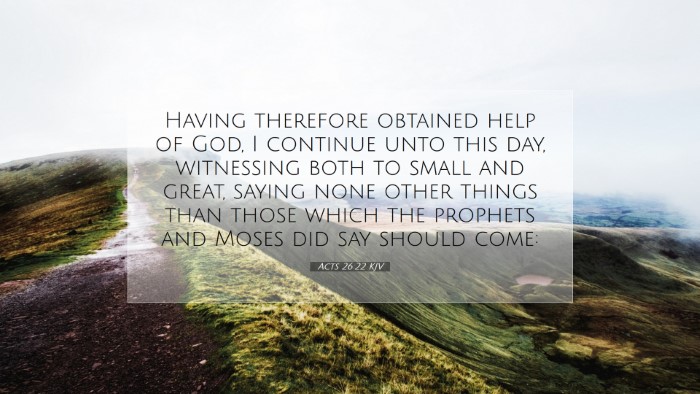Commentary on Acts 26:22
Acts 26:22 states, "Having therefore obtained help of God, I continue unto this day, witnessing both to small and great, saying none other things than those which the prophets and Moses did say should come:" This verse occurs during Paul’s defense before King Agrippa, where he emphasizes the continuity of his message with the writings of the Hebrew Scriptures. This commentary synthesizes insights from various public domain sources to deepen understanding of this pivotal verse.
Contextual Analysis
The broader context of Acts 26 encompasses Paul’s testimony of his conversion and calling. It serves to show both the historical and theological foundations of his ministry. Paul’s declaration that he has “obtained help of God” highlights the divine assistance he has received throughout his ministry, which comes into sharper focus when considering the challenges he faced. The verse signifies not just a personal affirmation but a theological assertion of God’s providence and faithfulness.
Divine Assistance
Paul attributes his perseverance to God's sustaining power. Matthew Henry states that "the help of God is the ground of a believer's hope; without this help, all attempts would be fruitless." This insight encourages believers to seek God's help in their ministries and personal lives. Adam Clarke points out that this phrase suggests a continuous reliance on God, which illustrates that effective ministry is not born of mere human effort but through divine empowerment.
Witnessing to All
Paul’s declaration of witnessing "both to small and great" emphasizes the universality of the Gospel. Albert Barnes notes, "The gospel is not confined to any class or rank; it is to be preached to all, regardless of social status." This serves as a reminder to modern readers and ministers about the inclusive nature of Christian evangelism. It challenges congregations to embrace the call to reach diverse audiences, reflecting God’s heart for all humanity.
Consistency with Scripture
The latter part of the verse refers to Paul’s commitment to proclaiming what "the prophets and Moses did say should come." Matthew Henry elucidates that this alludes to the prophetic writings that foreshadow Christ. This connection reinforces the continuity of God’s revelation and the fulfillment of promises throughout the Scriptures. It invites theological reflection regarding the importance of understanding Scripture in light of its fulfillment in Christ.
Implications for Theological Understanding
Acts 26:22 carries numerous implications for theological discourse. The reference to "Moses and the prophets" signifies the Jewish roots of Paul’s message, reinforcing the notion of fulfillment rather than replacement. Adam Clarke states that such an approach compels believers to view their faith not as a standalone ideology but as the culmination of God’s redemptive work throughout history. This aspect is critical for pastors and theologians as they navigate issues of continuity and discontinuity in scriptural interpretation.
Encouragement for Personal Evangelism
Paul’s unwavering commitment to his calling amidst adversity is an encouragement to all believers, particularly those in ministry. Albert Barnes suggests that “a true minister must continue his work, whatever obstacles he may meet." The challenges Paul faced, including imprisonment and opposition, serve as a potent reminder of the resilience required in evangelism. The call to witness, even in the face of difficulty, is a central theme that inspires evangelical fervor and strength.
Conclusion
Acts 26:22 is rich in theological and practical implications. The insights from public domain commentaries provide a multidimensional understanding of the verse, affirming God’s help, the inclusive call to witness, and the profound connection between the Old and New Testament revelations. For pastors, students, and theologians, this verse serves as a reminder of their mission and the divine resources available to support that mission. Thus, as they ponder Paul’s experience and words, they are called to reflect on their own ministry vitality, faithfulness, and commitment to proclaiming the Good News to all.


